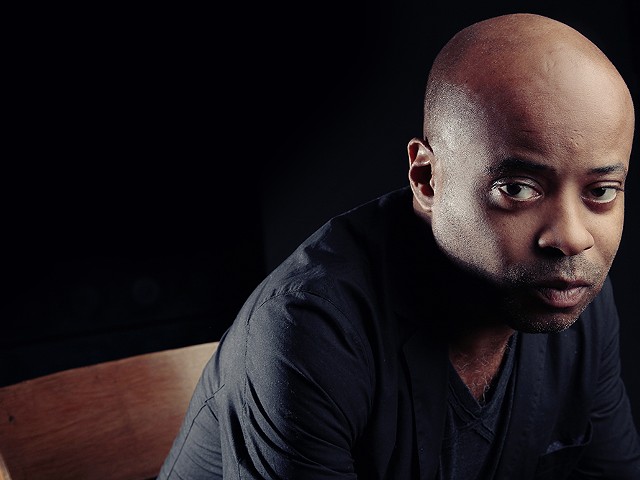Jeff Mills, aka The Wizard, is a techno music DJ and producer from Detroit. During the 1980s his nightly radio feature as The Wizard helped further and cement Detroit’s legacy in techno music. Mills has gone on to release more than 100 different projects and receive recognition and acclaim from all over the world. Metro Times talked to Mills via phone about all things Detroit, techno, and his latest album.
Metro Times: Let’s start from the beginning. What got you into techno music versus other forms of music?
Jeff Mills: There came to a point where the messages in hip-hop weren’t telling me or showing me anything more than I didn’t already know. This was around 1988, 1989, and I loved music. So I really wanted to continue to be involved and keep being a DJ. I got into producing with a certain type of focus on reaching further. I found some of that in techno music, where machines were being used differently, where new ideas from mixing other genres were being used, and more uptempo dance music. The mixture of people were from everywhere, so you had all types of ideas — afrobeat sounds mixed with house music, you had the early sounds of drum & bass that was coming from the U.K., you had rave music at that time. So I just moved away from hip-hop and just had to explore.
Metro Times: You were there at the ground level of techno music. Who were your musical DJ influences? Who inspired you as you were ascending through the early stages of your career?
Jeff Mills: In Detroit it was Ken Collier and Dale Willis who were big influences at the time. Stacey Hale, I remember being a teenager and going to listen to her when I was in high school. Outside of Detroit, the DJs from New York — Larry Levan, producer Shep Pettibone, David Morales, Tony Humphries, Frankie Knuckles. These are the DJs that were connected to Ken Collier and Dale Willis in some way.
Metro Times: Let’s take it back to 1986. You were known as “The Wizard” and you were the featured DJ on WJLB during the late nights. That was my first introduction to techno and house music. There are a lot of kids like me who were hovered over their boomboxes and radios with blank tapes ready to record the Wizard. What do you miss about that time period?
Jeff Mills: That was serious business. I was in competition because I was on at the same time as the Electrifying Mojo, so there was that aspect of competing and trying to get ratings. But behind the scenes it was pretty serious. I really didn’t see that much daylight because I was always looking for new music in some record store or traveling to some city like Chicago, Toronto, or on the phone trying to find something from New York. I had a studio in my apartment at the time. I was spending 8 hours a day just working on music, and preparing music for that night … trying to know what was working and what was not took a lot of time, too. So I was going around to all the record stores to see what people were asking for. It was a 24-hour thing. I was aware that kids were listening and I knew that every second and every moment could be worth something. It was also the station’s point of view to keep the Wizard quiet and never reveal my identity.
Metro Times: Techno music was so accessible back then. It was played in the clubs, on the radio, and many of the DJs worked at record stores. It feels like there’s a disconnect now. What happened?
Jeff Mills: This industry changed. We lost a certain type of community. Like to do a show like the Wizard, you had to know the city. You had to know the east side, you had to know the west side, you really had to get around to know what people might want to hear and I did just that. So years leading up to the Wizard show, I was a street DJ. This was during and after my internship with Dale. I was in the street doing house parties, wedding receptions, sorority parties. I was all over the place. So I had a lot of knowledge about the lisner. I remember on WDRQ, something like there were a half-million listeners at any given time. So you have to imagine, “Who are these people? What kind of music is going to make them stay on the radio station more?” By the time I got to the radio I knew how to mix it all up. I could play industrial Meat Beat Manifesto because that was part of the makeup of the city.
“I can tell you that Detroit, beyond its artists, beyond its DJs like myself, it has such a reputation. It’s such a legend of a city when it comes to music.”
tweet this
Metro Times: You’re a very well-traveled artist. There’s probably not a continent you haven’t spun on. How has Detroit influenced you over the years and does it influence you now?
Jeff Mills: Yeah, I definitely have some miles. I can tell you that Detroit, beyond its artists, beyond its DJs like myself, it has such a reputation. It’s such a legend of a city when it comes to music. I think it’s really beyond our control. I think that the impression that Europeans and Asians, Latin Americans, what they think about Detroit is something much more than we thought that we could create or bring to other places. There is no other city like it in the world Motown, rock ’n’ roll, and all those artists. And it’s all done with this certain perspective that you don’t compromise when it comes to music. The way we approach music is serious. And that's been handed down from generation to generation. I don’t think we have reached the full potential of how influential the city really is and has become. Just in regards to Detroit techno, it’s immeasurable how many people from Detroit taught people in Europe about dance music … So I can’t answer the question because it's very hard to note, there are so many aspects and factors are still developing as I’m speaking to you now.
Metro Times: Last year you released The Clairvoyant while we were in the midst of the pandemic, whereas this year Mind Power Mind Control comes out on the brink of the return of a real summer. What was your mindstate creating Mind Power Mind Control? Was it just a natural progression from coming out of this forced confinement to being able to come back outside?
Jeff Mills: Well, The Clairvoyant was definitely me sitting on my sofa and making a response to what was going on with the world. Mind Power Mind Control deals with the subject we’re going to have to deal with a few decades from now toward the end of the computer age and into the next age. About 100 years ago the industrial age started at the top of the century. It lasted for about 50 years, all the way down to around 1950, when they started to fool around with computers. The computer age started at that point and it will be the same thing. Mind Power Mind Control deals with that part of the century when something else is about to come and I have no idea what's that going to be. But I think that we’re in the prelude of what's going to come …. Mind Power Mind Control is my first proposal of what we should concentrate on to keep a rational mind as we go forward.
Metro Times: When you create, what comes first: the sound, or do you create the message you plan to convey first?
Jeff Mills: The idea comes first and then it's much easier to make the music because I know at least what the music should feel like. If it's something with a very abstract subject, I know I should play the keys a certain way, or desonate type of chord structures … and then I do a lot of research. With The Clairvoyant, I did research for months and months and months about 100 ago.
Metro Times: Tell us about film for Mind Power Mind Control.
Jeff Mills: In the film there are different scenarios and examples of how the mind is being used. There’s a lot of contemporary dance in the film. I’m using dancers in many different ways and the film displays how the mind is making these dancers do certain things through a special type of language they are using to say things that maybe aren’t even possible to say verbally.
Metro Times: What would the 2022 Jeff Mills tell the 1992 Jeff Mills? Like has anything changed with your creative processes?
Jeff Mills: Well, my thinking is almost the same in 2022 as it was in 1982. I still deal with music in basically the same way. My studio set-up is not too different as it was in 1982. I don’t still make music as the Wizard, but my mindset has not changed. I always want to use music as an instrument.
Metro Times: What can fans expert in the future? Is there another direction or shift you think you’ll go musically?
Jeff Mills: I’m constantly working on things electronic music needs. One of them is to express what a solo is, what a musician should do in the case of electronic music — not just letting the machine play the tracks, but what should the person do other than just press the button. So I’m exploring many different [ways] of putting the human aspect back into electronic music.
Metro Times: What can fans expect from your Movement set?
Jeff Mills: I think that the set should be if the Wizard were on the radio right now in Detroit. What would I play right now? With all the things and styles, if i had a radio show, what should I play? That sounds like it would be quite interesting to try that … not necessarily what they want to hear, but what do they need?
Mind Power Mind Control screens at 5 p.m., 7 p.m., and 9 p.m. on Sunday, May 29 at Cinema Detroit; 4126 Third Street, Detroit. Tickets are $8 and can be purchased online in advance at axisrecords.com.
Jeff Mills performs from 8:30-11 p.m. on Monday, May 30 at Movement Festival.
Stay connected with Detroit Metro Times. Subscribe to our newsletters, and follow us on Google News, Apple News, Twitter, Facebook, Instagram, Reddit, or TikTok.








